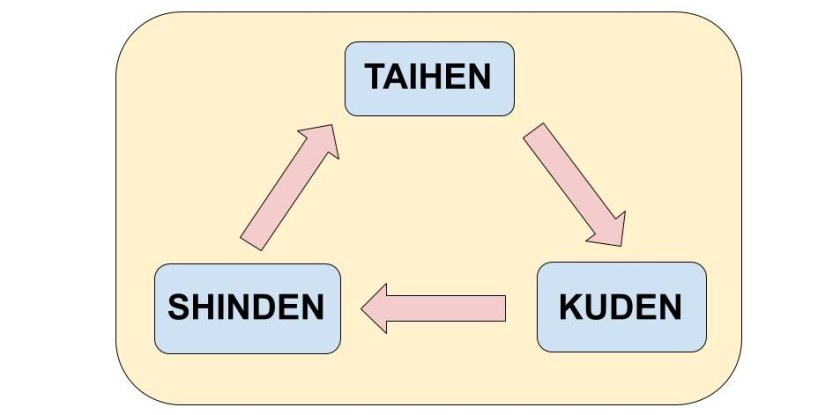Are you used to fail? I hope for you. This is good and the best way to improve your skills. When you learned to ride a bike, it was not easy, but you got it. It was the same when you learned how to swim. I am sure that today when you ride a bike or swim you don’t think about the “how to do it?”, you do it without thinking. Failure is the best teacher you can find. It teaches you more than success.
Edison said it took him 1,000 tries to make the light bulb working without exploding. A journalist told him that he failed one thousand times. He answered, “I have not failed 1,000 times—I’ve successfully found 1,000 ways that will not work.” When you learn Budō, this is the kind of attitude you should have.
In the west, our society forbids us to fail. This comes from our catholic education, our philosophy of life and our culture. But in the East, they regard failure differently. They consider it a chance to do better.
Failure in Japanese is Shippai. (1) It is made of two Kanji, the first one is “error” and the second one is “failure.” We fail because we make an error, and we make an error because we are not good enough yet. This is the learning process. Whatever you learn, it will take you a lot of time before you can master it. You need a mentor to guide you in this learning process. That is where the sensei enters.
In Japan, a series of three concepts: Taihen, Kuden, and Shinden explains transmission. In each word, the last kanji is “Hen” (or Den) which means “transmission” or “change”. (2)
- Taihen (大伝) is the body. This is the physical transmission learnt through repetition. (3)
- Kuden (口伝) is the knowledge acquired with experience (doing, learning, studying). (4)
- Shinden (神伝) is the ingrained knowledge (as if transmitted by the gods). (5)

The Human learning process always follows the same three-step process.
First, you learn the physical movement step by step. Speed and strength are not critical at this level of learning. Second, you fail until you learn how to do it well. This is also at this level that you are speeding up your moves. And third, you integrate the experience and stop thinking on how to do the movement. But the learning process doesn’t stop here, it continues. After you reached the first Shinden, begins another Taihen. Another Kuden follows, then another Shinden. This is a continuous process because perfection is never possible. You can always learn and improve your skills a bit more. Do not stop at what you know. Push the boundaries of your knowledge so that every day you can better your skills.
I see the Taihen, Kuden, Shinden process as a spring. Each full circle leads to the next coil, and it is going upward. You make progress by repeating the same things over and over. And you do that until you reach a new level, where you learn new things again. This is a continuous process.

That is why it is vital not to give up. Excellence takes time and is based upon multiple failures. You have to learn to fail better. Senō sensei said that when you learn a Kata, you make many errors. After many repetitions errors become smaller. And one day, you have it, but there is still room for improvement.
Hatsumi sensei has a beautiful sentence to explain it: “Ever tried? Ever failed? No matter! Try again. Fail again. Fail better! (6)
So, are you ready to be a better failure?
_________________________
1 失敗, Shippai; Failure
2 伝, hen; To transmit. Connections; influence. Change
3 大伝, Taihen; Teaching through the body
4 口伝, Kuden; oral instruction. Passing information by word-of-mouth. Oral tradition
5 神伝, Shinden; Teachings conveyed by the gods
6 From the book “Understand? Good. Play.” by Benjamin Cole
Visit us at http://www.koimartialart.com and watch hundreds of Bujinkan videos

Many thanks Arnaud This is full of great insights and words of encouragement
I hope you do not mind I will post a link to your blog in our Bujinkan London group and use that wonder quote
Hatsumi sensei has a beautiful sentence to explain it: “Ever tried? Ever failed? No matter! Try again. Fail again. Fail better!
I’m currently in japan training mainly with Tanaka, Ishizuka, and Kacem. The lessons are very insightful and there’s so many fine quality people here currently in this time of Bujinkan development.
Your presence is sorely missed though!!!
Keep safe my Bu-yu brother
Kindest regards
Robert
LikeLike
Thank you my friend. 🙏
LikeLike
Thank you Bro. This is insightful. I’m not a Ninja, i used to be Hard (and stupid/stubborn) so the world screwed me up, or I don’t know. Now i know, and now I’m weak. I tried so hard to fail again and again, fail better. But The System massaged my heart. … I have no belt but i’ve stuied martial arts from a distance, spesifically Karate – no belt.
LikeLike
I noticed a new edition of this blog post (right?). I just wanted … I have nothing more to add. Just to “take away” for improvement, which you came onto the so-called West-Eastern (Middle-East) take and source of Abrahamic Religions – Religion means Law or to Hold Back, compared with East-Asian view on Failure and their “Religion”.
Ninjutsu seems pretty Muslim in appeareance from what I’ve seen, and moving towards Unity of God. I have Autism (High Functioning Autism) in Arabic Autism is known as Oneness or Unity.
I have respect for your views. But like Monks and Warrior-Monks can not both be Right? Right? In The Quran it is a reocurring theme God is One, not Two. I call myself No Thing working for One Thing, whatever that means.
Kindly
Mustafa
LikeLike